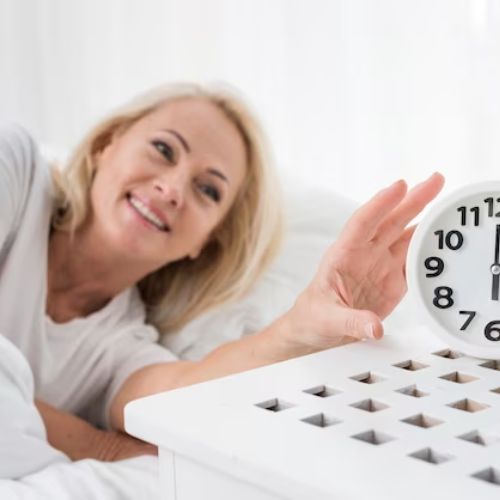As someone who values their health and seeks to make positive changes in daily life with the help of suitable supplements, I’ve always been intrigued by the intricate relationship between our bodies and the daily rhythms that govern our well-being. The sleep-wake cycle is one of the most crucial factors among these rhythms. So, let’s delve into the question: When is the optimal time to sleep and wake up? But let’s explore this topic beyond the usual advice and from a unique perspective, including the potential benefits of supplements for sleep.
Determining the Ideal Bedtime
The question of when to sleep isn’t merely about getting some shuteye; it’s about harmonizing with your body’s natural circadian rhythms. These internal biological clocks orchestrate a significant portion of your daily physiological and psychological functions.
Usually for most adults, the best time to doze off to sleep is between 10 P.M. and 11 P.M. This particular time frame aligns with the body’s natural drop in the core temperature, which acts as a signal for sleep. Falling asleep during this window allows you to tap into the first crucial sleep cycle, characterized by deep and restorative slow-wave sleep.
However, it’s crucial to understand that variations exist among individuals. Some folks are naturally inclined to be “night owls” and may feel more alert and active during the evening. Others identify as “early birds” and experience their peak energy levels in the morning. You need to discover a sleep schedule that resonates with your biological rhythm, which enables you to achieve consistent and adequate rest.
If you find it difficult to sleep on your own, you might want to consider incorporating natural sleep supplements into your routine. Options such as valerian root, melatonin, or chamomile tea can complement your efforts to establish a healthy sleep routine.
The Significance of Consistency
Consistency is a fundamental tenet of good sleep hygiene, regardless of your inherent sleep preferences. Going to bed and waking up at the exact times daily aids in regulating your body’s internal clock. This consistency reinforces your circadian rhythm, making it easier to fall asleep and wake up at your desired times.
Consistency should extend to your weekends as well. While the allure of staying up late and sleeping in on weekends is strong, it can disrupt your circadian rhythm, resulting in what’s known as “social jet lag.” This misalignment between your weekend and weekday sleep patterns can leave you groggy and irritable when Monday morning rolls around.
Optimal Wake-Up Times
So, we’ve covered the ideal bedtime, but what about waking up? The prime time to wake up falls in the early morning, around 6:00 AM to 7:00 AM. It aligns with the natural rise in cortisol, often called the “stress hormone,” which helps you feel alert and ready to tackle the day.
Waking up early also offers a psychological advantage. It grants you a tranquil and uninterrupted period for introspection, goal-setting, and mindfulness. These moments of solitude can set a positive tone for your day and enhance your overall well-being.
Harnessing Natural Light
To maximize the benefits of waking up early, expose yourself to natural light as soon as possible. Natural light exposure assists in regulating your circadian rhythm and reinforcing your morning alertness. Open your curtains, walk outside briefly, or enjoy breakfast beside a sunlit window.
Conversely, limit your exposure to artificial light, remarkably the blue light emitted by electronic devices, during the evening hours. Blue light can disrupt your circadian rhythm, making falling asleep at your desired bedtime harder.
The Influence of Individual Variations
It is important to understand individual differences can remarkably determine the optimal times to sleep and wake up. Some people can easily thrive on less sleep, while others need eight hours of beauty sleep to function properly. Age, genetics, and lifestyle can all influence your sleep needs.
People who work in shifts and that too gets changed every now and then face unique challenges. Many of these people sleep at unusual times, which throws off their body’s natural sleep-wake cycle and makes it difficult to establish a regular pattern. They can cope with this challenge by using blackout curtains, sleep masks, and earplugs to create such an environment that promotes a peaceful sleep.
Striking a Balance in Your Sleep Schedule
It can be a tricky balancing act to find the ideal sleep-wake cycle that fits your particular needs and lifestyle. Even though getting up early in the morning is typically thought of as the optimal time, everyone has a different ideal time for bedtime.
It is essential to make sure that you get adequate sleep by going to bed earlier to cater to your sleep requirements if you naturally tend to stay up late but have early morning commitments at work. In such cases, sleep supplements can occasionally prove to be helpful, but it is important to use them under medical supervision.
Conclusion
It is important to pay heed to your body’s signals and align with the sleep routine of your body’s internal clock when you choose the ideal time to go to bed and wake up. The basic strategy includes working for regularity in your sleep schedule, including weekends, and attempting to wake up early in the morning and increase your body’s natural energy.
We should also acknowledge that each individual is unique and what works for one may not be the best option for another. For a holistic well being, setting a proper sleep schedule along with the appropriate sleep friendly atmosphere is vital.
By incorporating exposure to natural light into your everyday activities, the advantages of having a well-timed sleep-wake routine can be further improved. And on those rare instances when falling asleep seems impossible, consider taking a sleep aid on a doctor’s advice.
The search for the ideal sleeping and waking hours is ultimately quite individualized. To ensure restful evenings and stimulating mornings, you must figure out what works best for you.




